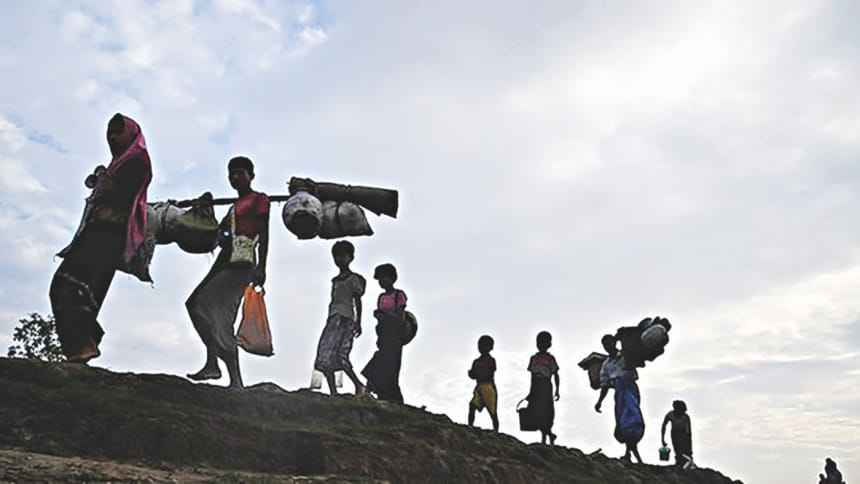Statelessness and displacement

Human beings do not want to live as refugees which is completely a form of leading very inhumane life. In today’s global order, refugee crisis is one of the very complex challenges for the politically less-influenced countries. There are various reasons for the people to become refugees. But the main contributory factor to this crisis prevalent in the world is, armed conflict and ethnic cleansing perpetrated on the marginalised and minority group of people by their own State machinery.
Armed conflict and/or violence break out in a certain country when a section of people or political group revolts against their own State and the State functionary then uses force to silence the dissident. Aside from that, a State sometimes brands its own people or a particular political party as rebels when they denounce the political view of the party in power or merely because they belong to a specific political, religious or ethnic group. State itself unleashes atrocities and oppression on them which leaves a vast populace homeless and they resultantly take refuge to other countries. Take for example, the ongoing Rohingya crisis which is now one of the most pressing and much talked about issues in the global order.
At present, more than a million Rohingyas have taken shelter in a tiny district town of Bangladesh, Cox’s Bazar which is the tourist hub having longest sea-beach of the world but has now become a threat of ecological imbalance. So, what are the root causes for the Rohingyas to become refugees? Simple answer is, they are the Muslim minorities in Myanmar which is their only fault and for that, they have been subjected to inhumane torture, killing, rape, arson, displacement by the Myanmar army. This is a classic case of ‘ethnic cleansing’ allegedly perpetrated by the Myanmar government. Rohingya Muslims have been living in Rakhine for generations, but now the state is denying their citizenship.
Bangladesh is an over-populated country of 170 million people. But only for the sake of humanity to those huge distressed people and to keep regional harmony, Bangladesh has sheltered those vast number of helpless people as was done by India during our war of liberation in 1971 sheltering 10 million people showing rare example of generosity. The Hon’ble Prime Minister Sheikh Hasina has left no stone unturned to raise this most burning issue in different global forums whenever she gets the scope urging the world community to compel Myanmar to take back their people. She has even very robustly placed the issue in the recently concluded UN General Assembly meeting. But Myanmar still remains unmoved.
Now, the question remains, where does the solution of such refugee crisis lie? Can the world body compel the defiant countries to take back these displaced people to their own land? Or can it be any lasting solution to depend on the international agencies of their aid for the survival of the refugees for years together? I myself am not so optimistic over its early solutions in the given system of the world body. Because, big powers who are considered to take leading part in resolving this burning crisis, are mostly driven by their own national interest over humanity. As when any resolution leading to resolving such crisis is placed before the UN Security Council, those big powers (five permanent members of the Security Council) then exercise their most powerful weapon, i.e. veto.
On the flipside, International Criminal Court (ICC) and International Court of Justice (ICJ) cannot do anything substantial unless the impugned country ratifies the charter of these two international Courts. But cruel reality is that, crime of genocide, crimes against humanity, extermination, deportation and other inhuman acts are being committed unabatedly under the very nose of the United Nations. Positive news is that recently the ICC Chief Prosecutor has been authorised to start an investigation into the alleged crime against humanity of forcible deportation of the Rohingyas.
We can no more remain as silent spectators to this most pathetic event and criminal acts diabolic in nature. Here, Article 51 of the Indian Constitution deserves attention. Article 51 refers that the State shall endeavour to: (a) promote international peace and security; (b) maintain just and honourable relations between nations; (c) foster respect for international law; and (d) encourage settlement of international disputes by arbitration. In order to establish a strong regional association like, SAARC, ASEAN, the above mentioned four significant points may guide us to hold the countries accountable. While dealing with refugee crisis, the affected country may take the dispute to the designated court determined by the association of the countries for redress, making the verdict binding upon the countries in dispute. And if it is materialised, the interference of big powers and dependency on the UN Security Council in tackling many global issues will be lessened up and peace and security will be restored to a great extent in the whole world.
So, let us take a holistic approach and urge the world leaders to be united in bringing about the global issues through mutual understanding, arbitration and settlement in order to uphold humanity, peace, prosperity and make this planet safe and secured for all human beings - by shunning petty interests and stopping brutal use of weapons against innocent people. Because civilisation is now at stake which we are all pledged bound to preserve.
The writer is Judge, High Court Division, Supreme Court of Bangladesh.
Note: This is an abridged version of the paper presented in the 20th International Conference of Chief Justices of the World, organised by City Montessorie School Lucknow, India, on 6-12 November 2019.

 For all latest news, follow The Daily Star's Google News channel.
For all latest news, follow The Daily Star's Google News channel. 



Comments